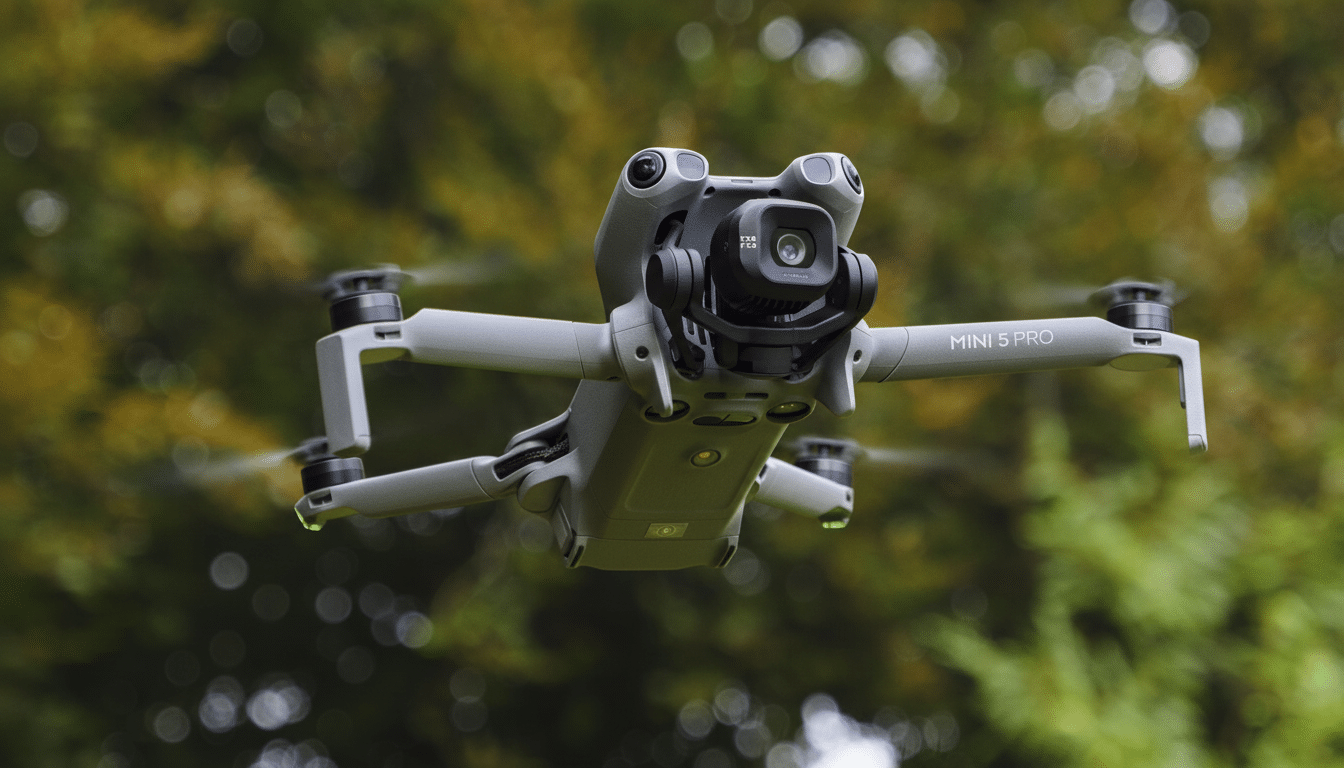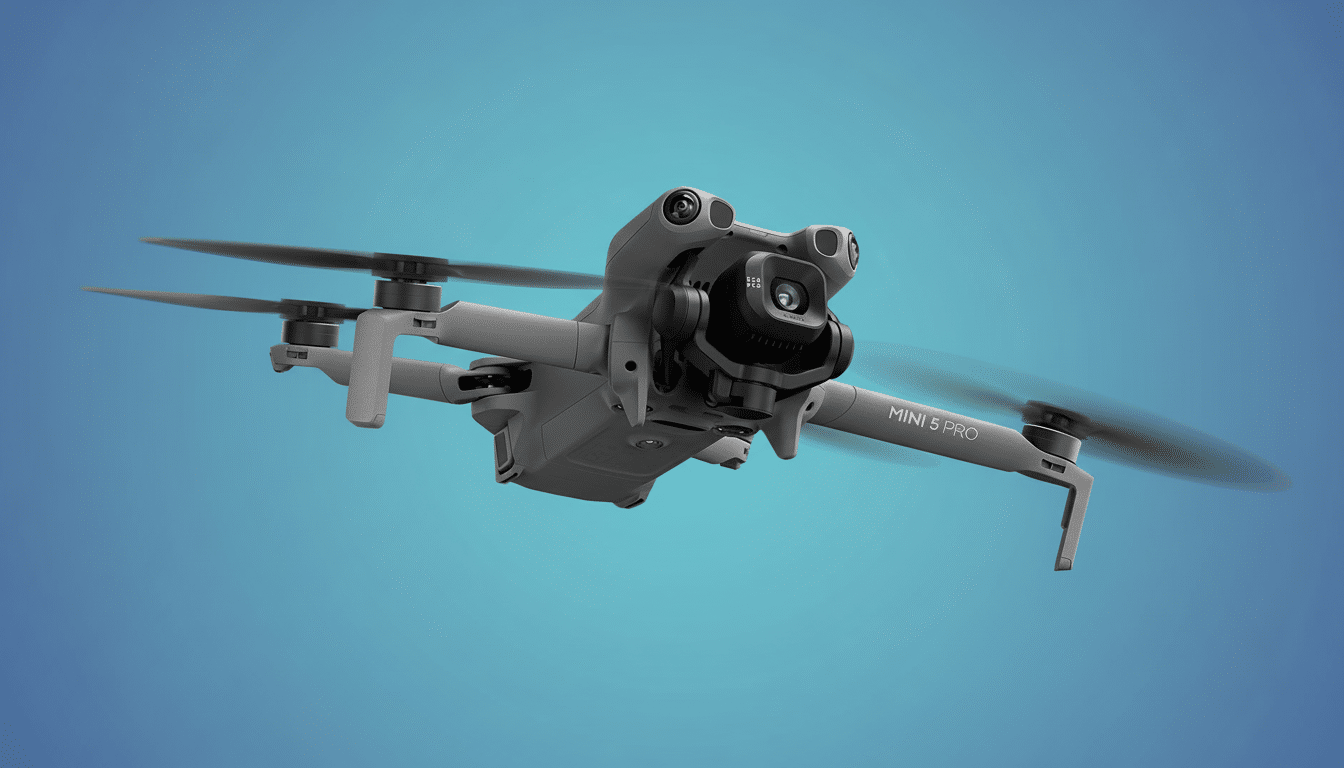DJI’s latest ultralight flyer, the Mini 5 Pro, is set to take off in several markets — but the company still isn’t opening the doors at home for U.S. buyers. The maker is preparing to take its act worldwide — even as it has de‑emphasized, though not yet stopped, direct sales via its American storefront — which highlights the strange limbo still besieging consumer drones in the United States.
Why the U.S. is getting passed over for launch
There is no official, nationwide ban on consumer DJI drones, but the policy environment is murky. DJI is on the U.S. Department of Commerce’s Entity List to restrict sensitive exports, federal agencies have purchasing restrictions based on national‑security reviews, and a number of states have enacted their own procurement limits for public‑safety fleets. Industry watchers also note federal legislation — like the Countering CCP Drones Act and iterations of the American Security Drone Act — that have been proposed and could further restrict use at the federal level, with some banning approvals on certain communications equipment.

Against that backdrop, DJI’s U.S. online store has periodically gone silent on new airframes — while international channels have continued moving stock. That doesn’t stop Americans from flying the brand’s products — it’s operations that are regulated by the F.A.A., not brands — but it does make official, first‑party access difficult. DJI hasn’t provided much of an explanation, but the move clearly slashes political risk and maintains momentum from global sales.
Mini 5 Pro: small size, big improvements
The specs paint a tale of a meaningful evolution over the Mini 4 Pro. Now they are combining a lightweight airframe you can fly full freestyle — and that is fit for sub‑250 g flying in Europe — with a 50‑megapixel image and one‑inch folding IS.CONNEX transmission. The company is also promoting enhanced dynamic in‑camera zoom and better subject tracking that relies on ActiveTrack 360, with a new cycling mode built to keep riders framed during winding turns.
Its flight endurance moves up to a claimed 36 minutes on the standard pack, with a Battery Plus upgrade extending that to a stated 52 minutes.
That kind of runway is more than a convenience; for solo shooters and drone surveyors, it can shave one‑third or so off launch cycles on your average shoot.
A 225‑degree rotating gimbal allows for true vertical recording and more extreme tilt angles without having to do awkward post‑processing, a wink toward social platforms that favor vertical framing. DJI also lists an improved front‑facing ranging system — this has LiDAR on top of enhanced vision sensors — which in turn feeds omnidirectional obstacle detection to ensure safe margins around trees, poles, and building edges.
If you import, understand the potential trade-offs
With no official U.S. sales, those in the States may look to third‑party retailers or take an overseas trip if they want the Mini 5 Pro. It’s possible, but there are some caveats: manufacturer warranties and DJI Care coverage (which you likely bought with your device) can be region‑tied, and cross‑border repairs might require more time to process or may not even be available. Consumers should check for serial eligibility before activating protection plans.

Radio compliance also matters. DJI radios will auto‑TX for local power limits (e.g., FCC vs CE). However, import TXs still need to comply with U.S. spectrum and Remote ID. The FAA’s Remote ID rule applies no matter where in the world a drone was purchased; most recent DJI drones sold are compliant, but pilots have to ensure their aircraft and apps transmit according to regulations and that they are updated with the latest firmware.
Oh, and don’t forget that registration nuance: sub‑250 g drones are generally exempt from requiring federal registration for purely recreational flying (Part 336), but they must be registered if being used for commercial work under Part 107. Insurance companies may also demand proof of Remote ID and registration even for small drones being used on paying gigs.
The broader context of the global drone market
Sitting out a U.S. launch doesn’t diminish DJI’s global heft.
Analysts at Drone Industry Insights have long held that the company’s consumer and prosumer share is significantly higher than half of all sales worldwide. In the United States, though, the gaping hole of first‑party selection has sparked some buyers to smaller rivals and enterprise‑focused homegrown brands, even if those offerings seldom equal Mini‑class bang for the buck.
The result is a bifurcated landscape: public agencies and defense‑adjacent users are funneled toward approved alternatives, while independent creators, real‑estate marketers, and farm operators keep being drawn to DJI’s compact platforms for image quality and ecosystem depth. The sensor and flight‑time gains made by the Mini 5 Pro, meanwhile, speak directly to those use cases — which is what makes the fact that it’s missing from official U.S. shelves all the more curious.
Bottom line: what U.S. buyers should know right now
The Mini 5 Pro is every inch the next‑gen ultralight: improved imaging, extended flights, intelligent tracking, and safer navigation — in a palm‑sized package. For now, however, Americans can’t buy it from DJI’s American storefront. If you’re set on getting a U.S. version to fly, consider things like warranty service, compliance checks, and the day‑to‑day reality of flying an imported machine — and watch for policy considerations that might change availability overnight.

